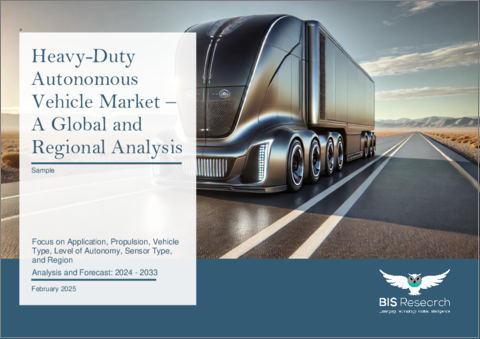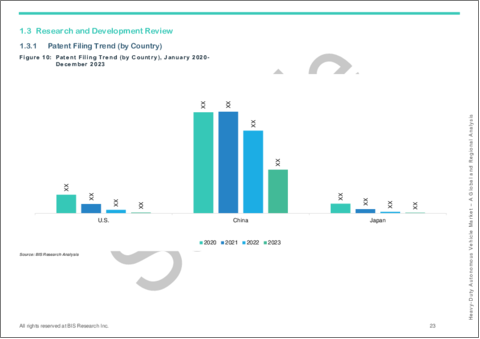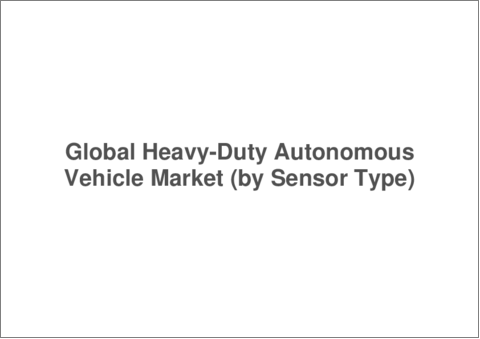|
|
市場調査レポート
商品コード
1658639
大型自律走行車市場 - 世界および地域別分析:用途別、推進力別、車両タイプ別、自律性レベル別、センサータイプ別、地域別 - 分析と予測(2024年~2033年)Heavy-Duty Autonomous Vehicle Market - A Global and Regional Analysis: Focus on Application, Propulsion, Vehicle Type, Level of Autonomy, Sensor Type, and Region - Analysis and Forecast, 2024-2033 |
||||||
カスタマイズ可能
|
|||||||
| 大型自律走行車市場 - 世界および地域別分析:用途別、推進力別、車両タイプ別、自律性レベル別、センサータイプ別、地域別 - 分析と予測(2024年~2033年) |
|
出版日: 2025年02月20日
発行: BIS Research
ページ情報: 英文 254 Pages
納期: 1~5営業日
|
全表示
- 概要
- 目次
大型自律走行車(HDAV)市場は、物流、鉱業、建設における自動化の進展に牽引され、急速な成長を遂げています。
2024年の市場規模は1,735億米ドルと推計され、現実的なシナリオではCAGR 31.18%で2033年には1兆9,900億米ドルに達すると予測されています。この拡大に拍車をかけている主な要因には、効率的で費用対効果が高く、持続可能な輸送ソリューションに対するニーズの高まりとともに、AI、ロボット工学、IoTの進歩があります。自律走行トラックは、貨物輸送業務を最適化し、燃料消費を削減し、ドライバー不足に対処しています。各国政府も自律走行技術の採用を促進するための規制枠組みやインセンティブを導入しており、市場の進化をさらに加速させています。
| 主要市場統計 | |
|---|---|
| 予測期間 | 2024年~2033年 |
| 2024年の評価 | 1,735億米ドル |
| 2033年予測 | 1兆9,955億8,000万米ドル |
| CAGR | 31.18% |
大型自律走行車(HDAV)市場は、人工知能(AI)、機械学習、自動化の進歩によって牽引され、これらの車両が人間の介入を最小限に抑えて運行できるようになっています。これらの車両は、センサー、IoTデバイス、予測分析と統合され、安全性を高め、運用コストを削減し、物流、公共交通、建設、農業などの業界全体で効率を向上させる。市場は、半自律型(SAEレベル1~2)と完全自律型(SAEレベル3~5)に区分され、自動化、環境持続可能性、技術革新に対する需要の高まりが成長を後押ししています。
大型自律走行車市場は、自動化、人工知能、コネクティビティ技術の進歩により著しい成長を遂げています。同市場は現在、物流、公共輸送、産業用途における効率化需要の高まりが牽引しています。企業は、車両の安全性、自律性、運用コスト効率を高めるため、研究開発に多額の投資を行っています。予測期間(2024年~2033年)には、規制当局の支援、電気自動車やハイブリッド自律走行車の採用拡大、高度なセンサー技術の統合に後押しされ、市場は急拡大すると予想されます。しかし、初期投資コストの高さやサイバーセキュリティリスクなどの課題が成長に影響を与える可能性があります。こうしたハードルにもかかわらず、自律走行トラック、バス、産業車両が主流になることで、この業界は輸送に革命を起こそうとしています。
大型自律走行車(HDAV)が産業界に与える影響は、特に物流、鉱業、建設において甚大です。これらの車両は、労働力への依存を減らし、ドライバー不足を緩和し、24時間365日の継続的な操業を確保することで、業務効率を高める。キャタピラーやコマツなどの自律走行型採掘トラックは、安全性、コスト効率、生産性を大幅に改善し、キャタピラーでは生産性が30%向上したと報告しています。ロジスティクス分野では、燃費効率の高い運転アルゴリズムが利益をもたらし、二酸化炭素排出量を削減しながら、運用コストを最大5%削減します。さらに、EUにおけるレベル4の自律性承認や中国における積極的な試験など、規制の進歩が業界の採用を加速させています。しかし、初期コストの高さ、サイバーセキュリティのリスク、インフラの制約といった課題が、本格的な導入の障壁となっています。
当レポートでは、世界の大型自律走行車市場について調査し、市場の概要とともに、用途別、推進力別、車両タイプ別、自律性レベル別、センサータイプ別、地域別の動向、および市場に参入する企業のプロファイルなどを提供しています。
目次
エグゼクティブサマリー
市場:業界の展望
大型自律走行車市場(用途別)
- 物流
- 公共輸送
- 建設・鉱業
- その他
大型自律走行車市場(推進力別)
- 内燃機関(ICE)車
- 電気自動車(EV)
- バッテリー電気自動車(BEV)
- プラグインハイブリッド車(PHEV)
- ハイブリッド電気自動車(HEV)
大型自律走行車市場(車両タイプ別)
- 大型トラック
- 大型バス
- ロボシャトル
大型自律走行車市場(自律性レベル別)
- 半自律走行車
- 自律走行車
大型自律走行車市場(センサータイプ別)
- LiDAR
- レーダー
- カメラ
- その他
大型自律走行車市場(地域別)
- 北米
- 欧州
- アジア太平洋
- その他の地域
競合情勢
- 今後の見通し
- 地理的評価
- 企業プロファイル
- AB Volvo
- BMW Group
- General Motors
- PACCAR Inc.
- Renault Trucks
- Traton Group
- New Flyer (NFI Group)
- Karsan
- Zoox, Inc.
- Embark Trucks Inc.
- TuSimple
- Waymo LLC
- Daimler Truck AG
- Navya ARMA
- EasyMile
- Einride
- Oxa Autonomy Limited
- Waabi
- Gatik Inc.
- Shanghai Newrizon Technology Co., Ltd.
- Kodiak Robotics, Inc.
- Torc Robotics
- Mobileye
- ZF Friedrichshafen AG
- Schaeffler AG
- HOLON GmbH
- Aurora Innovation Inc.
- PlusAI, Inc.
調査手法
Heavy-Duty Autonomous Vehicle Market Overview
The heavy-duty autonomous vehicle (HDAV) market has been experiencing rapid growth, driven by increased automation in logistics, mining, and construction. The market size in 2024 was estimated at $173.5 billion and is projected to reach $1.99 trillion by 2033, with a CAGR of 31.18% under a realistic scenario. Key factors fueling this expansion include advancements in AI, robotics, and IoT, alongside the growing need for efficient, cost-effective, and sustainable transport solutions. Autonomous trucks are optimizing freight operations, reducing fuel consumption, and addressing driver shortages. Governments are also implementing regulatory frameworks and incentives to promote autonomous technology adoption, further accelerating the market's evolution.
Introduction of Heavy-Duty Autonomous Vehicle
| KEY MARKET STATISTICS | |
|---|---|
| Forecast Period | 2024 - 2033 |
| 2024 Evaluation | $173.5 Billion |
| 2033 Forecast | $1995.58 Billion |
| CAGR | 31.18% |
The heavy-duty autonomous vehicle (HDAV) market is driven by advancements in artificial intelligence (AI), machine learning, and automation, enabling these vehicles to operate with minimal human intervention. These vehicles are integrated with sensors, IoT devices, and predictive analytics, enhancing safety, reducing operational costs, and improving efficiency across industries such as logistics, public transportation, construction, and agriculture. The market is segmented into semi-autonomous (SAE Level 1-2) and fully autonomous (SAE Level 3-5) vehicles, with growth being propelled by increasing demand for automation, environmental sustainability, and technological innovation.
Market Introduction
The heavy-duty autonomous vehicle market has been witnessing significant growth due to advancements in automation, artificial intelligence, and connectivity technologies. The market is currently driven by increasing demand for efficiency in logistics, public transportation, and industrial applications. Companies are investing heavily in R&D to enhance vehicle safety, autonomy, and operational cost efficiency. Over the forecast period (2024-2033), the market is expected to expand rapidly, propelled by regulatory support, increased adoption of electric and hybrid autonomous vehicles, and integration of advanced sensor technologies. However, challenges such as high initial investment costs and cybersecurity risks may impact growth. Despite these hurdles, the industry is set to revolutionize transportation, with autonomous trucks, buses, and industrial vehicles becoming more mainstream.
Industrial Impact
The industrial impact of heavy-duty autonomous vehicles (HDAVs) is profound, particularly in logistics, mining, and construction. These vehicles enhance operational efficiency by reducing labor dependency, mitigating driver shortages, and ensuring continuous, 24/7 operations. Autonomous mining trucks from companies such as Caterpillar and Komatsu have significantly improved safety, cost-efficiency, and productivity, with Caterpillar reporting a 30% increase in productivity. The logistics sector benefits from fuel-efficient driving algorithms, reducing operational costs by up to 5% while lowering carbon emissions. Additionally, regulatory advancements, such as Level 4 autonomy approvals in the EU and proactive testing in China, have accelerated industry adoption. However, challenges such as high initial costs, cybersecurity risks, and infrastructure limitations remain barriers to full-scale implementation.
Market Segmentation
Segmentation 1: by Application
- Logistics
- Public Transportation
- Construction and Mining
- Others
Logistics Segment to Dominate the Heavy-Duty Autonomous Vehicle Market (by Application)
The logistics sector is the dominant application for heavy-duty autonomous vehicles. The rising demand for efficiency, cost reduction, and 24/7 operations in supply chains has accelerated the adoption of autonomous trucks. These vehicles significantly lower freight costs, enhance route planning and improve overall delivery times. Additionally, the growth of e-commerce has fueled the need for scalable and cost-effective transportation solutions.
Segmentation 2: Global Conventional Heavy-Duty Vehicle Market (by Application)
- Construction and Mining
- Public Transport
- Agriculture
- Freight And Logistics
- Others
Segmentation 3: by Propulsion Type
- Internal Combustion Engine (ICE) Vehicles
- Electric Vehicles (EVs)
- Battery Electric Vehicle (BEV)
- Plug-in Hybrid Electric Vehicle (PHEV)
- Hybrid Electric Vehicle (HEV)
Internal Combustion Engine (ICE) Vehicles to Dominate the Heavy-Duty Autonomous Vehicle Market (by Propulsion Type)
Despite the global shift toward electrification, internal combustion engine (ICE) vehicles remain the dominant propulsion type in the heavy-duty autonomous vehicle market. The well-established refueling infrastructure, superior range, and high payload capacity make ICE-powered autonomous trucks the preferred choice for long-haul transportation and industries such as mining and construction. However, manufacturers are introducing hybrid models and fuel-efficient technologies to comply with strict emission regulations.
Segmentation 4: by Vehicle Type
- Heavy Trucks
- Heavy Buses
- Robo Shuttles
Heavy Trucks to Dominate the Heavy-Duty Autonomous Vehicle Market (by Vehicle Type)
Among vehicle types, heavy trucks lead the market due to their widespread use in logistics, mining, and industrial applications. The shift toward automation in trucking addresses challenges such as labor shortages, high operational costs, and safety concerns. Autonomous heavy trucks operate continuously without breaks, reducing fuel consumption and increasing delivery efficiency. Companies such as Waymo, TuSimple, and Daimler Truck AG are at the forefront of autonomous heavy truck deployment.
Segmentation 5: by Level of Autonomy
- Semi-Autonomous Vehicles
- Autonomous Vehicles
Semi-Autonomous Vehicles to Dominate the Heavy-Duty Autonomous Vehicle Market (by Level of Autonomy)
Semi-autonomous heavy-duty vehicles (SAE Level 1 and 2) are currently leading the market. To enhance safety and efficiency, these vehicles integrate advanced driver assistance systems (ADAS), including lane-keeping, adaptive cruise control, and emergency braking. The gradual transition to full autonomy is driven by regulatory challenges, infrastructure limitations, and public trust concerns. However, semi-autonomous trucks serve as a bridge to fully autonomous fleets, improving productivity while maintaining human oversight.
Segmentation 6: by Sensor Type
- LiDAR
- RADAR
- Camera
- Others
LiDAR to Dominate the Heavy-Duty Autonomous Vehicle Market (by Sensor Type)
Light detection and ranging (LiDAR) technology is the leading sensor type in autonomous heavy-duty vehicles. Its high accuracy in depth perception, object detection, and environmental mapping makes it critical for safe autonomous operation. LiDAR sensors enable vehicles to navigate complex traffic conditions, detect obstacles in real-time, and operate in low-visibility environments. Major industry players, including Mobileye and Waymo, are investing heavily in LiDAR-based perception systems.
Segmentation 7: Global Conventional Heavy-Duty Vehicle Market (by Vehicle Type)
- Heavy Trucks
- Heavy Buses
Segmentation 8: by Region
- North America (U.S., Canada, Mexico)
- Europe (Germany, France, U.K., Italy, Rest-of-Europe)
- Asia-Pacific (China, Japan, India, South Korea, Rest-of-Asia-Pacific)
- Rest-of-the-World (RoW)
North America to Dominate the Heavy-Duty Autonomous Vehicle Market (by Region)
North America is the leading region in the heavy-duty autonomous vehicle market, driven by strong technological advancements, regulatory support, and major industry players. The U.S. is in charge of companies such as Tesla, Waymo, TuSimple, and Daimler Truck AG, which are investing heavily in autonomous trucking, logistics automation, and AI-driven fleet management. The region's well-established highway infrastructure and growing demand for freight efficiency have accelerated the deployment of self-driving trucks, particularly in long-haul logistics. Additionally, favorable government policies, including regulatory approvals for autonomous vehicle testing and commercial operations, have positioned North America at the forefront of market growth. As adoption increases, the region is expected to drive further innovation and large-scale commercialization of autonomous heavy-duty vehicles.
Recent Developments in the Heavy-Duty Autonomous Vehicle Market
- Aurora Innovation announced plans to operate driverless semi-trucks between Dallas and Houston by the end of 2024. This initiative addresses driver shortages, improves transportation efficiency, and reduces delivery times.
- In July 2024, Vayu Robotics introduced Vayu One, an AI-powered, self-driving delivery vehicle capable of navigating without pre-mapping. The six-foot-long robot can travel at 20 miles per hour and carry up to 100 pounds, offering a scalable and cost-effective solution for goods transport.
- In July 2024, AB Volvo unveiled a new fleet of autonomous loaders and articulated haulers designed for complex construction tasks. These vehicles feature advanced operational control systems, adapting to varied terrain and weather conditions.
- In September 2024, Caterpillar launched its next-gen autonomous drill rigs with enhanced data analytics capabilities. The rigs are designed to optimize mining operations by reducing material waste and improving drilling precision.
- In January 2024, Waymo completed autonomous trials of its Freightliner Cascadia trucks, covering over 700 miles between California and Nevada with no human intervention. The trials demonstrated the efficiency and reliability of autonomous trucking in long-haul freight.
Demand - Drivers, Limitations, and Opportunities
Market Demand Drivers: Escalating Transportation Costs
The rising costs associated with transportation are becoming a critical driver for the adoption of heavy-duty autonomous vehicles. Key contributors to escalating transportation costs include increasing fuel prices, labor shortages leading to higher wages for drivers, maintenance expenses for aging fleets, and the impact of stringent regulatory requirements. These factors are pushing industries to seek more efficient and cost-effective solutions, positioning autonomous vehicles as a viable alternative.
Fuel prices, a major cost component in transportation, have been volatile, with global events such as geopolitical tensions and supply chain disruptions driving spikes in fuel costs. Autonomous vehicles can help optimize fuel efficiency through advanced algorithms that ensure optimal driving patterns, significantly reducing fuel consumption. For instance, autonomous trucks developed by Inceptio Technology have demonstrated fuel savings of 3-5% compared to traditional vehicles through their fuel-efficient driving algorithms.
Market Challenges: Heightened Risk of Cyberattacks
The growing reliance on advanced technology and connectivity in heavy-duty autonomous vehicles introduces a significant vulnerability to cyberattacks, posing a critical market restraint. Autonomous vehicles operate using sophisticated networks of sensors, software systems, and vehicle-to-everything (V2X) communication, all of which are potential targets for malicious actors. These attacks compromise operational efficiency and raise serious concerns about safety, privacy, and public trust in autonomous technology. One of the most pressing risks is the potential for hackers to take control of vehicle operations through system breaches. This could lead to dangerous scenarios, such as unauthorized control over braking, steering, or acceleration, endangering lives and disrupting supply chains.
Market Opportunities: Delivering Higher Levels of Automation
The drive to achieve higher levels of automation presents a significant opportunity in the heavy-duty autonomous vehicle market. As industries such as logistics, construction, mining, and public transportation seek to optimize operations, autonomous vehicles capable of advanced automation are emerging as transformative solutions. Higher levels of automation, particularly Levels 4 and 5, reduce the reliance on human intervention, enabling vehicles to operate efficiently, safely, and continuously in various environments.
In the logistics sector, the adoption of higher automation levels addresses critical challenges, including rising transportation costs and driver shortages. Fully automated trucks can operate around the clock without the need for rest breaks, maximizing fleet utilization and improving delivery times. For instance, companies such as Waymo and TuSimple have been piloting Level 4 autonomous trucking solutions that handle long-haul routes with minimal human input. These advancements enhance operational efficiency and significantly lower costs by reducing driver-related expenses and optimizing fuel consumption through intelligent driving systems.
How can this Report add value to an Organization?
This report adds value to an organization by providing in-depth insights into the global heavy-duty autonomous vehicle (HDAV) market, enabling data-driven decision-making and strategic growth planning. It highlights key market trends, technological innovations, and competitive dynamics, helping businesses identify emerging opportunities and potential challenges. The report's detailed segmentation by application, propulsion type, vehicle type, level of autonomy, and region allows organizations to target specific markets and optimize their business strategies. Additionally, its coverage of regulatory frameworks, sustainability initiatives, and cybersecurity concerns ensures companies stay compliant with evolving autonomous vehicle policies and safety standards. By leveraging this report, organizations can enhance operational efficiency, make informed investment decisions in automation and AI-driven logistics, and gain a competitive edge in the rapidly transforming heavy-duty transportation sector, ensuring long-term growth and industry leadership.
Research Methodology
Factors for Data Prediction and Modelling:
- The base currency considered for the market analysis is US$. Currencies other than the US$ have been converted to the US$ for all statistical calculations, considering the average conversion rate for that particular year.
- The currency conversion rate was taken from the historical exchange rate on the Oanda website.
- Nearly all the recent developments from January 2021 to November 2024 have been considered in this research study.
- The information rendered in the report is a result of in-depth primary interviews, surveys, and secondary analysis.
- Where relevant information was not available, proxy indicators and extrapolation were employed.
- Any economic downturn in the future has not been taken into consideration for the market estimation and forecast.
- Technologies currently used are expected to persist through the forecast with no major technological breakthroughs.
Market Estimation and Forecast
This research study involves the usage of extensive secondary sources, such as certified publications, articles from recognized authors, white papers, annual reports of companies, directories, and major databases to collect useful and effective information for an extensive, technical, market-oriented, and commercial study of the heavy-duty autonomous vehicle market.
The market engineering process involves the calculation of the market statistics, market size estimation, market forecast, market crackdown, and data triangulation (the methodology for such quantitative data processes is explained in further sections). The primary research study has been undertaken to gather information and validate the market numbers for segmentation types and industry trends of the key players in the market.
Primary Research
The primary sources involve industry experts from the heavy-duty autonomous vehicle market and various stakeholders in the ecosystem. Respondents such as CEOs, vice presidents, marketing directors, and technology and innovation directors have been interviewed to obtain and verify both qualitative and quantitative aspects of this research study.
The key data points taken from primary sources include:
- validation and triangulation of all the numbers and graphs
- validation of reports segmentation and key qualitative findings
- understanding the competitive landscape
- validation of the numbers of various markets for market type
- percentage split of individual markets for geographical analysis
Secondary Research
This research study involves the usage of extensive secondary research, directories, company websites, and annual reports. It also makes use of databases, such as Hoovers, Bloomberg, Businessweek, and Factiva, to collect useful and effective information for an extensive, technical, market-oriented, and commercial study of the global market. In addition to the data sources, the study has been undertaken with the help of other data sources and websites, such as the Census Bureau, OICA, and ACEA.
Secondary research was done to obtain crucial information about the industry's value chain, revenue models, the market's monetary chain, the total pool of key players, and the current and potential use cases and applications.
The key data points taken from secondary research include:
- segmentations and percentage shares
- data for market value
- key industry trends of the top players of the market
- qualitative insights into various aspects of the market, key trends, and emerging areas of innovation
- quantitative data for mathematical and statistical calculations
Key Market Players and Competition Synopsis
The companies that are profiled in the heavy-duty autonomous vehicle market have been selected based on inputs gathered from primary experts who have analyzed company coverage, product portfolio, and market penetration.
Some of the prominent names in this market are:
- AB Volvo
- BMW Group
- General Motors
- PACCAR Inc.
- Renault Trucks
- Traton Group
- New Flyer (NFI Group)
- Karsan
- Zoox, Inc.
- Embark Trucks Inc.
- TuSimple
- Waymo LLC
- Daimler Truck AG
- Navya ARMA
- EasyMile
- Einride
- Oxa Autonomy Limited
- Waabi
- Gatik Inc.
- Shanghai Newrizon Technology Co., Ltd.
- Kodiak Robotics, Inc.
- Torc Robotics
- Mobileye
- ZF Friedrichshafen AG
- Schaeffler AG
- HOLON GmbH
- Aurora Innovation Inc.
- PlusAI, Inc.
Companies not part of the aforementioned pool have been well represented across different sections of the report (wherever applicable).
Table of Contents
Attached in the mail






